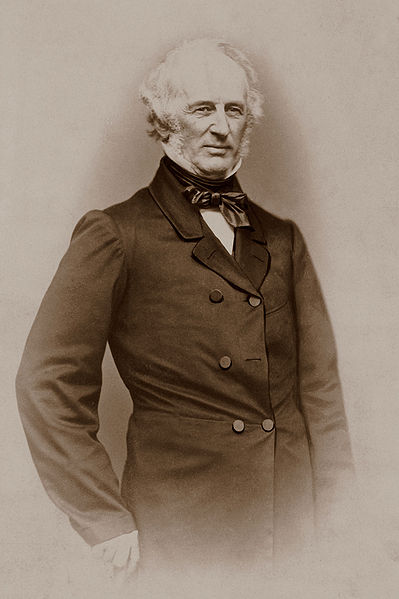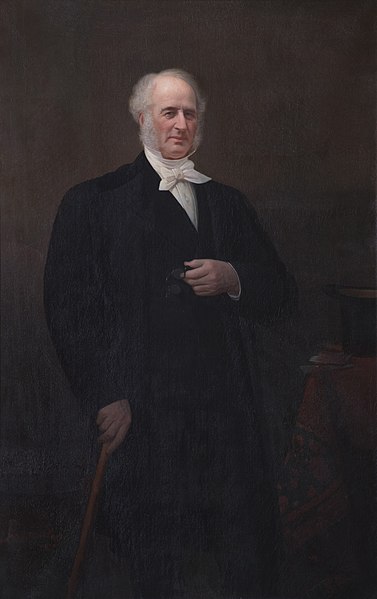Cornelius Vanderbilt, born on May 27, 1794, in Staten Island, New York, was a prominent American business magnate known for his remarkable rise from humble beginnings to becoming one of the wealthiest individuals in the 19th century.
His career spanned various facets of transportation, from being a ferryman to steamship entrepreneur and ultimately a railroad tycoon.
Vanderbilt’s influence extended beyond business as he engaged in famous rivalries, engaged in philanthropy, and left a significant mark on American history. In this overview, we will explore key aspects of his life and legacy.
Cornelius Vanderbilt Facts
1. Born on May 27, 1794, in Staten Island, New York
Cornelius Vanderbilt was born into a humble family on Staten Island, one of New York City’s five boroughs.
He was the fourth of nine children born to Cornelius van Derbilt and Phebe Hand. His family was not wealthy, and he grew up with limited resources.

2. Started as a ferryman
Vanderbilt’s career began at a young age when he started working as a ferryman. In 1810, at the age of 16, he purchased a small periauger (a type of sailing vessel) with a loan from his parents.
Also Read: John D. Rockefeller Timeline
He used this boat to start a ferry service between Staten Island and Manhattan, transporting passengers and goods. This early entrepreneurial venture laid the foundation for his future successes in transportation.
3. Earned the nickname “Commodore”
As Cornelius Vanderbilt expanded his business ventures in the shipping industry, his success and influence grew. In recognition of his accomplishments in the steamship industry, he was given the honorary title of “Commodore.”
This title was not a military rank but a mark of respect and recognition for his achievements as a leader in the maritime sector. It was a nickname that stayed with him throughout his life and became synonymous with his legacy in transportation.
4. Became a steamship entrepreneur
In the early 19th century, Cornelius Vanderbilt recognized the potential of steamships as a more efficient and reliable means of transportation compared to traditional sailing vessels.
Also Read: Biltmore Estate Facts
He transitioned from operating sailboats to steamships, which were powered by steam engines. Vanderbilt became a successful steamship entrepreneur, providing passenger and freight services in the waters around New York, particularly along the Hudson River and Long Island Sound.
His ventures in the steamship industry marked the beginning of his rise as a transportation magnate.

5. Wealth came from investments in railroads
While Vanderbilt had achieved success in the steamship business, his greatest wealth and influence were derived from investments in the emerging railroad industry.
He foresaw the potential of railroads to revolutionize transportation and commerce in the United States. Vanderbilt aggressively expanded his holdings by acquiring and consolidating various railroad lines, often engaging in competitive and sometimes ruthless tactics to gain control.
One of his most significant achievements was gaining control of the New York Central Railroad, which became the cornerstone of his railroad empire.
Vanderbilt’s leadership in the railroad industry allowed him to amass enormous wealth and exert substantial control over transportation networks in the United States during the 19th century.
6. Owned the New York Central Railroad
Cornelius Vanderbilt’s crowning achievement in the railroad industry was the ownership of the New York Central Railroad, one of the largest and most influential railroad systems in the United States.
Under his leadership, the New York Central Railroad expanded its reach, connecting major cities and facilitating the movement of goods and people across the country.
Vanderbilt’s control of this extensive railroad network solidified his status as a dominant figure in American business and transportation. His management skills and aggressive approach to industry consolidation set a precedent for future business leaders in the Gilded Age and left a lasting legacy in the development of America’s railroads.

7. Engaged in a famous rivalry with Daniel Drew
Cornelius Vanderbilt was involved in a well-known rivalry with Daniel Drew, another prominent figure in the railroad industry during the 19th century. The rivalry included a financial battle known as the “Erie War.”
At the center of this conflict was the struggle for control of the Erie Railroad, a major rail line in the northeastern United States. Both Vanderbilt and Drew sought to gain control of the company, leading to intense and sometimes unscrupulous tactics, including stock manipulation and courtroom battles.
Vanderbilt ultimately prevailed, gaining control of the Erie Railroad and expanding his influence further.
8. Known for philanthropic donations
Despite his reputation as a ruthless businessman, Cornelius Vanderbilt also engaged in philanthropic activities. He made substantial donations to various causes, including educational and religious institutions.
One of his most notable philanthropic contributions was the endowment of a significant sum to Central University in Nashville, Tennessee, which was later renamed Vanderbilt University in his honor. This act of philanthropy established a lasting legacy of educational excellence associated with the Vanderbilt name.
9. One of the wealthiest individuals in the U.S
At the height of his career, Cornelius Vanderbilt was one of the wealthiest individuals in the United States and, indeed, the world. His vast fortune was estimated to be in the hundreds of millions of dollars, an astonishing sum during the 19th century.
His success in both the steamship and railroad industries allowed him to amass this wealth, earning him the title of one of the richest men in America during his time.
10. Passed away on January 4, 1877
Cornelius Vanderbilt passed away on January 4, 1877, in New York City. His death marked the end of an era in American business and transportation. His legacy continued through the influence of the Vanderbilt family, who remained active in philanthropy and business ventures.
Vanderbilt’s contributions to the development of the transportation industry, as well as his philanthropic endeavors, left an enduring mark on American society and business during the Gilded Age and beyond.
